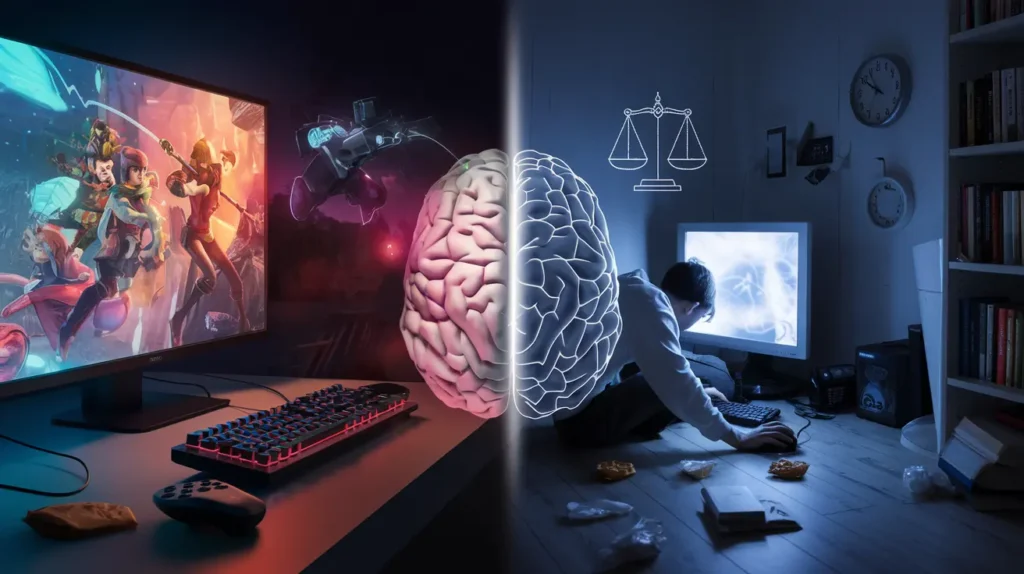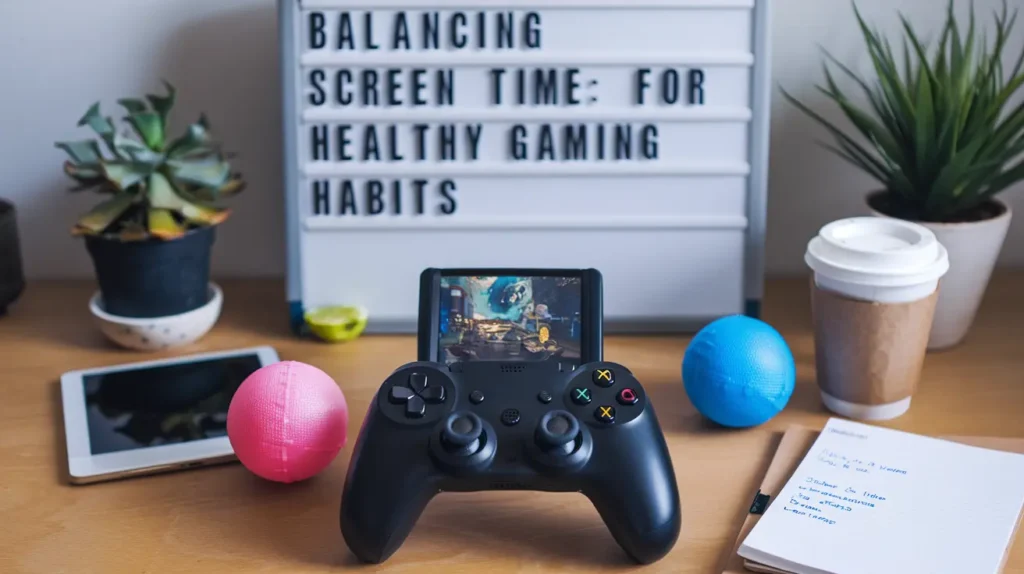The question has sparked debates among parents, educators, and gamers alike: Are video games bad for you? On one hand, critics warn of potential risks like addiction, sedentary lifestyles, and negative impacts on mental health.
On the other hand, research reveals surprising benefits—improved cognitive abilities, enhanced problem-solving skills, and even stronger social connections.
In this article, we’ll dive deep into the heart of this controversy, separating fact from fiction. From debunking common myths about gaming to uncovering its hidden advantages, we’ll explore how video games influence our lives in ways you might not expect.
Whether you’re a casual player or a dedicated enthusiast, understanding both sides of the equation can help you make informed decisions about your gaming habits.

So, grab your controller (or mouse and keyboard) and join us as we unravel the complexities of gaming’s impact on mental acuity, emotional well-being, and social interaction. Together, we’ll challenge stereotypes, celebrate the positive effects, and find balance in the ever-evolving world of interactive entertainment.
Table of Contents
How Are Video Games Bad for You? Understanding the Potential Risks
As the gaming industry has grown exponentially over the decades, so have concerns about its potential negative effects on mental and physical health. Critics frequently highlight issues like addiction, aggression, and social isolation as significant risks tied to prolonged gaming sessions. These fears are often amplified by sensational media reports and anecdotal evidence, creating a widespread perception that video games can be harmful.
For instance, excessive gaming is closely linked to a sedentary lifestyle, which increases the risk of obesity and related health conditions. With the convenience of gaming consoles, smartphones, and PCs, it’s easy for individuals to lose track of time, leading to extended periods of inactivity. Moreover, research suggests that exposure to violent content in some games may desensitize players to violence and potentially increase aggressive thoughts or behaviors, though the evidence remains mixed and context-dependent.
Another concern revolves around social development. Some critics argue that immersive gaming experiences might lead to isolation and a decline in face-to-face interactions, particularly among younger players who prioritize virtual friendships over real-life connections. Additionally, the phenomenon of gaming addiction—recognized by the World Health Organization as “gaming disorder”—raises important questions about balancing enjoyment with compulsive behavior. Symptoms include an inability to control gaming habits, prioritizing gaming over other activities, and continuing to play despite negative consequences.
While these risks deserve attention, it’s equally important to explore the benefits that gaming brings to individuals and society as a whole.
The Surprising Health Benefits of Playing Video Games
Despite valid concerns about the risks of video gaming, numerous studies reveal surprising health benefits that showcase the positive impact of gaming on cognitive, emotional, and social well-being.
Action-packed games, for example, have been shown to improve spatial awareness, hand-eye coordination, and problem-solving skills. Gamers often exhibit superior multitasking abilities and faster reaction times compared to non-gamers. These cognitive enhancements translate into real-world applications, such as improved performance in tasks requiring quick thinking and adaptability.
Gaming also serves as an effective tool for stress relief and relaxation. Many people turn to video games after a long day to escape daily pressures and decompress. Engaging in gameplay triggers the release of dopamine—a neurotransmitter associated with pleasure and reward—which elevates mood and reduces feelings of anxiety. Certain genres, such as mindfulness-focused or relaxing games, actively promote mental well-being and help players develop coping mechanisms to manage stress.
Furthermore, multiplayer games foster social connections and a sense of community. By encouraging collaboration and teamwork, these games allow players to connect with others across the globe, combating loneliness and isolation. For those who struggle with traditional social settings, gaming provides a supportive network where meaningful relationships can flourish.
Are Video Games Healthy? Discover the Unexpected Ways They Improve Well-Being
Beyond cognitive and emotional benefits, video games also contribute significantly to physical health. Active gaming, or exergaming, has gained popularity as a fun way to incorporate physical activity into daily routines. Titles that utilize motion sensors encourage players to engage in activities promoting cardiovascular fitness, coordination, and overall physical well-being. This fusion of gaming and exercise appeals especially to individuals who find traditional workouts tedious or intimidating.
In addition to physical health, video games serve as powerful educational tools. Serious games designed with specific learning objectives teach subjects ranging from mathematics to history through interactive gameplay. By making education engaging and enjoyable, these games ignite a passion for knowledge in players of all ages. The immersive nature of video games enhances retention and understanding, making them valuable resources for educators and learners alike.
Perhaps most notably, the therapeutic potential of video games is increasingly recognized in mental health treatment. Game-based therapies offer innovative approaches to addressing conditions like PTSD (Post-traumatic stress disorder), depression, and anxiety. By providing a safe space for patients to confront their fears and emotions, video games facilitate healing and recovery. This shift underscores the importance of viewing video games not just as entertainment but as tools for improving overall well-being.
Balancing Screen Time: Tips for Healthy Gaming Habits

As the benefits of gaming become clearer, adopting healthy gaming habits becomes crucial to mitigate potential risks. One of the most effective strategies is establishing clear boundaries around screen time. Setting specific limits for gaming sessions helps prevent excessive play and encourages engagement in other activities. The American Academy of Pediatrics recommends limiting recreational screen time to no more than one to two hours per day for children and teenagers, fostering a balanced lifestyle that includes physical activity, social interaction, and academic responsibilities.
Prioritizing the quality of games played further enhances the overall experience.
Opting for games that challenge cognition or foster social connections promotes positive outcomes. Educational or cooperative games, for instance, encourage learning and teamwork. Parents and guardians should take an active role in researching games, ensuring they are age-appropriate and aligned with family values.
Lastly, incorporating regular breaks during gaming sessions improves both physical and mental health. Short pauses to stretch, hydrate, and rest the eyes combat the strain associated with prolonged screen time. These breaks refresh the mind, allowing players to return to gaming with renewed focus and enthusiasm. By cultivating a culture of balance and mindfulness, individuals can fully enjoy the many benefits of gaming while minimizing risks.
Myth vs. Reality: Debunking Common Misconceptions About Video Games
The discourse surrounding video games is often clouded by misconceptions and stereotypes that don’t reflect the reality of gaming. One prevalent myth is that all gamers are socially awkward and isolated. In truth, many gamers actively participate in online communities, forging meaningful friendships through shared experiences. Multiplayer games require teamwork and communication, fostering camaraderie and lasting relationships. This social aspect of gaming is particularly beneficial for individuals who may struggle with interpersonal interactions in person.

Another misconception is that video games waste time and contribute little to personal development. Research shows otherwise; many gamers hone valuable skills like critical thinking, strategic planning, and leadership through gameplay. Navigating complex scenarios, making quick decisions, and collaborating with others all contribute to personal growth and skill development.
Finally, the notion that video games are inherently violent and harmful oversimplifies the diverse landscape of gaming. While some games contain violent content, countless others promote creativity, problem-solving, and emotional intelligence. The impact of violent games varies among individuals, highlighting the importance of context and individual differences. By examining the broader range of gaming experiences, we can appreciate the wealth of positive opportunities gaming offers.
The Role of Parents and Guardians in Promoting Responsible Gaming
Parents and guardians play a pivotal role in guiding children and teens toward responsible gaming practices. Open communication is key; discussing gaming habits, preferences, and concerns fosters a healthy understanding of video gaming. Conversations about content and gameplay experiences help children develop critical thinking skills and discernment when choosing games. This dialogue also provides opportunities to address any negative experiences or emotions related to gaming, reinforcing emotional well-being.

Establishing family gaming guidelines further promotes responsible habits. These might include setting screen time limits, designating tech-free zones, or scheduling family gaming nights to encourage shared experiences. Modeling healthy gaming behavior demonstrates the importance of balance and responsibility. Involving children in creating these guidelines empowers them to take ownership of their habits and cultivate accountability.
Monitoring game content ensures children engage with age-appropriate material. Familiarizing oneself with game ratings and reviews helps parents make informed decisions. Exploring games together fosters connection and allows parents to better understand their children’s interests. By taking an active role, parents help children navigate the world of video games safely and responsibly.
Future of Gaming: How Advances in Technology Are Making Games Healthier
and augmented reality (AR) revolutionize player engagement, offering opportunities for physical activity and social interaction in entirely new dimensions. VR games requiring movement provide fun workouts while immersing players in captivating virtual worlds.
Gamification extends beyond entertainment into sectors like education and healthcare. Educational institutions increasingly integrate game-based learning into curricula, making subjects more engaging and accessible. Healthcare professionals explore video games for rehabilitation and therapeutic interventions, leveraging interactivity to motivate patients and enhance treatment outcomes.
As gaming technology evolves, developers prioritize features promoting healthy gaming habits, such as reminders to take breaks or set time limits. This shift reflects growing awareness of balancing entertainment with well-being. With ongoing innovation and emphasis on health, the future of gaming promises to be both entertaining and beneficial for individuals and society.
How to balance gaming with other activities
Finding a balance between gaming and other activities is essential for maintaining overall well-being. One effective approach is to create a structured schedule that allocates time for gaming, physical activity, social interactions, and other hobbies. By setting aside specific time blocks for each activity, individuals can ensure that gaming does not overshadow other important aspects of life. This structured approach helps in developing a well-rounded lifestyle, allowing for personal growth and fulfillment in various areas.

Engaging in a diverse range of activities can also enhance the gaming experience. For instance, participating in outdoor sports or creative pursuits can provide a refreshing break from screen time, allowing individuals to return to gaming with renewed energy and focus. Exploring new hobbies or interests outside of gaming can help individuals discover new passions and talents, enriching their lives beyond the virtual realm. By cultivating a variety of interests, gamers can develop a more balanced perspective and reduce the likelihood of becoming overly absorbed in gaming.

Furthermore, incorporating social elements into gaming can help balance virtual and real-life interactions. Organizing gaming sessions with friends or family can transform gaming into a communal experience, fostering connections and shared memories. Additionally, participating in group activities, such as sports or community events, can enhance social skills and provide opportunities for face-to-face interactions. By blending gaming with other activities, individuals can create a harmonious balance that promotes both enjoyment and well-being.
Key Takeaways
- Potential Risks of Video Games
- Excessive gaming can lead to a sedentary lifestyle, increasing the risk of obesity and related health issues.
- Violent games may desensitize players to violence, though evidence is mixed and context-dependent.
- Gaming addiction (“gaming disorder”) is recognized as a mental health condition, with symptoms including loss of control over gaming habits.
- Health Benefits of Video Games
- Cognitive benefits include improved spatial awareness, hand-eye coordination, problem-solving skills, and multitasking abilities.
- Gaming serves as an effective stress reliever, promoting mental well-being through dopamine release.
- Multiplayer games foster social connections, combatting loneliness and isolation.
- Physical and Educational Impact
- Active gaming (exergaming) promotes physical activity, making exercise fun and engaging.
- Serious games enhance learning by teaching subjects like math, history, and critical thinking in interactive ways.
- Therapeutic potential: Video games are increasingly used for treating conditions like PTSD, depression, and anxiety.
- Balancing Screen Time
- Establish clear boundaries and set time limits for gaming sessions.
- Prioritize quality over quantity—choose games that promote cognitive challenges or social interaction.
- Incorporate regular breaks to reduce strain on eyes and body.
- Debunking Myths
- Gamers aren’t inherently socially awkward; multiplayer games often build strong communities and friendships.
- Gaming isn’t just a waste of time—it develops valuable skills like critical thinking, strategic planning, and teamwork.
- Not all games are violent; many genres focus on creativity, problem-solving, and emotional intelligence.
- Role of Parents and Guardians
- Open communication helps guide children toward responsible gaming practices.
- Set family guidelines, monitor game content, and explore games together to ensure age-appropriate choices.
- Future of Gaming
- Advances in VR/AR technology create immersive experiences that combine entertainment with physical activity and education.
- Developers are prioritizing features that encourage healthy gaming habits, such as reminders to take breaks.
10 Calming Games to Reduce Anxiety and Unwind
Mindful Escapes
- Stardew Valley: Tend to pixel-perfect farms, bond with quirky villagers, and lose yourself in seasonal rhythms.
- ABZÛ: Glide through serene underwater landscapes, accompanied by a hauntingly beautiful score.
- Journey: Traverse windswept deserts and ancient ruins in this wordless, emotionally resonant adventure.
Creative Sanctuaries
- Animal Crossing: New Horizons: Build your dream island, decorate cozy spaces, and enjoy slow-paced island life.
- The Sims 4: Craft stories, design homes, and control a stress-free virtual universe.
- House Flipper: Renovate dilapidated houses into stunning homes—no power tools required!
Soothing Exploration
- No Man’s Sky: Wander infinite galaxies, discover alien planets, and soak in the cosmic calm of procedural beauty.
- Minecraft (Creative Mode): Build anything imaginable in a blocky paradise free from threats.
Emotional Comfort
- Spiritfarer: Guide spirits to the afterlife in this bittersweet, heartfelt game about love and letting go.
- Firewatch: Unwind in Wyoming’s wilderness while unraveling a mystery through reflective, story-driven gameplay.
More of about relaxing Cozy games Post
Gaming Addiction: Signs, Solutions, and Support Resources
If gaming starts feeling like it’s controlling you—like skipping responsibilities, feeling irritable when offline, or using games to avoid stress—it might be time to pause. Start small: set time limits (try Xbox/PlayStation parental controls!), take regular breaks, and create screen-free zones. For tougher struggles, therapists or programs like Game Quitters can help. You’re not alone—online groups like r/StopGaming offer support. Balance is key, so you can keep gaming fun without losing yourself. 💙
Conclusion: The Verdict on Whether Video Games Are Bad for You
Ultimately, the question of whether video games are bad for you cannot be answered with a simple yes or no.
While excessive gaming carries risks like addiction and social isolation, evidence highlights a wealth of benefits enhancing cognitive skills, emotional well-being, and social connections.
Recognizing the nuances of gaming and adopting responsible habits enables individuals to enjoy its positive aspects while mitigating drawbacks.
Parents and guardians play a vital role in promoting healthy gaming habits through open communication and structured guidelines.
As technology advances, the future of gaming offers promise for even more engaging and health-conscious experiences. By embracing a balanced approach, individuals can cultivate fulfilling relationships with video games.
The key lies in fostering a mindful and responsible attitude toward gaming. When approached thoughtfully, video games serve as powerful tools for learning, connection, and personal growth. As we continue exploring the possibilities within the gaming world, challenging preconceived notions and appreciating the diverse experiences gaming offers will remain essential.
FAQs
Are video games bad for your brain ?
While excessive gaming may negatively impact attention span or sleep patterns, moderate play has been shown to improve cognitive functions like memory, problem-solving, and multitasking.
Is gaming healthy ?
Yes, gaming can be healthy when balanced. It enhances cognitive skills, reduces stress, fosters social connections, and even promotes physical activity through exergaming.
How much video gaming is too much for adults ?
Experts recommend limiting recreational screen time to no more than 2-3 hours per day for adults. Prolonged gaming without breaks can lead to fatigue, eye strain, and reduced productivity.
Are video games bad when you have a concussion ?
Yes, video games should generally be avoided during recovery from a concussion due to their potential to exacerbate symptoms like headaches, dizziness, and sensitivity to light.
Are video games good or bad for you debate ?
Both sides present valid points. While excessive gaming poses risks like addiction and isolation, moderate gaming offers cognitive, emotional, and social benefits.
Do video games cause aggression ?
Research suggests that violent games may increase aggressive thoughts in some individuals, but the effect varies widely depending on personality, context, and frequency of play.
Can video games improve mental health ?
Absolutely! Certain games help manage stress, anxiety, and depression by providing relaxation, distraction, and opportunities for achievement and connection.
What are the long-term effects of playing video games ?
Long-term effects depend on usage patterns. Balanced gaming improves cognitive skills and emotional resilience, while excessive gaming may contribute to sedentary behavior and social withdrawal.
Is it okay to let kids play video games ?
Yes, if played in moderation and with parental supervision. Age-appropriate games can enhance learning, creativity, and social skills while minimizing potential risks.
How do I know if someone is addicted to video games ?
Signs of gaming addiction include neglecting responsibilities, losing interest in other activities, hiding gaming habits, and experiencing withdrawal symptoms when unable to play.








